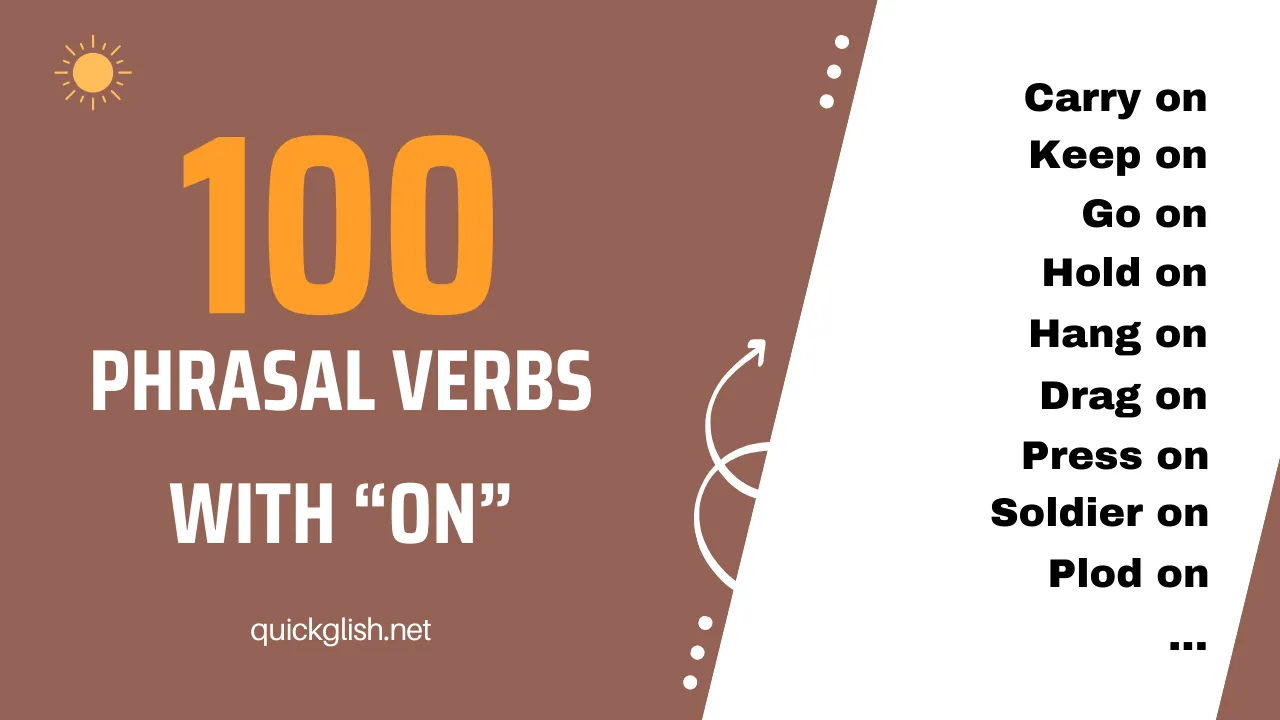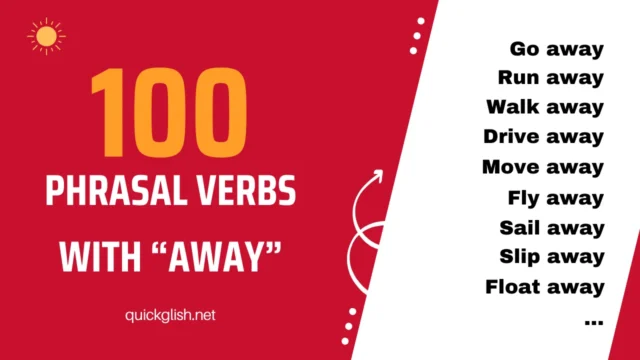Phrasal verbs are combinations of verbs and particles that create meanings different from the original verb alone. The particle “on” often indicates continuation, attachment, or forward movement.

This collection of 100 phrasal verbs with “on” will help you enhance your English vocabulary and sound more natural in conversations.
Continuation and persistence
Carry on
To continue doing something.
“Despite the rain, they carried on with the outdoor concert.”
Keep on
To continue doing something without stopping.
“He keeps on making the same mistakes.”
Go on
To continue or proceed.
“Please go on with your story; I’m listening.”
Hold on
To wait or to grip tightly.
“Hold on a moment while I check the schedule.”
Hang on
To wait briefly or to persevere.
“Hang on, I’ll be with you in a minute.”
Drag on
To continue for too long in a tedious way.
“The meeting dragged on for three hours.”
Press on
To continue despite difficulties.
“We need to press on with the project despite the setbacks.”
Soldier on
To persevere through difficulty.
“She soldiered on through her illness to finish her degree.”
Plod on
To continue steadily but slowly.
“The hikers plodded on through the muddy trail.”
Trudge on
To continue walking laboriously.
“They trudged on through the deep snow.”
Starting and progress
Get on
To progress or to board a vehicle.
“How are you getting on with your new job?”
Move on
To proceed to something else or to recover from something.
“After discussing the budget, we moved on to marketing plans.”
Take on
To accept responsibility for or to hire.
“The company is taking on new employees.”
Come on
To encourage someone to hurry or to begin to happen.
“Come on, we’ll be late for the movie!”
Start on
To begin working on something.
“I need to start on my homework.”
Sign on
To agree officially to work for someone.
“He signed on with the company last month.”
Try on
To put on clothing to see if it fits or looks good.
“She tried on several dresses before choosing one.”
Put on
To place something on your body or a surface.
“Put on your coat before going outside.”
Bring on
To cause something to happen.
“Stress can bring on headaches.”
Drive on
To continue driving.
“After a brief stop, we drove on to our destination.”
Focus and attention
Focus on
To concentrate on something.
“Let’s focus on solving one problem at a time.”
Concentrate on
To direct your attention toward something.
“I need to concentrate on my studies.”
Work on
To try to improve something or make progress with a task.
“She’s working on her communication skills.”
Decide on
To make a choice about something.
“We need to decide on a date for the meeting.”
Fixate on
To become obsessively focused on something.
“He tends to fixate on minor details.”
Dwell on
To think about something too much.
“Don’t dwell on past mistakes.”
Count on
To depend on someone or something.
“You can count on me to help you move.”
Bank on
To rely on something happening.
“Don’t bank on winning the lottery.”
Pick on
To tease or bully someone.
“The older students were picking on the younger ones.”
Zero in on
To focus precisely on something.
“The detective zeroed in on the most likely suspect.”
Communication
Pass on
To communicate or transmit information.
“Please pass on the message to everyone in the department.”
Report on
To give information about something.
“The journalist reported on the political situation.”
Comment on
To express an opinion about something.
“The professor commented on my essay.”
Catch on
To understand or to become popular.
“The new dance craze is really catching on.”
Elaborate on
To give more details about something.
“Could you elaborate on your proposal?”
Harp on
To talk about something repeatedly in an annoying way.
“He’s always harping on about his achievements.”
Let on
To reveal or disclose information.
“Don’t let on that we know about the surprise party.”
Ramble on
To talk for a long time in a confusing way.
“The speaker rambled on for an hour without making his point.”
Clue on
To inform or give information about something.
“My colleague clued me on about the changes in schedule.”
Check on
To make sure someone or something is okay.
“I’ll check on the children to see if they’re asleep.”
Happening and occurrence
Go on
To happen.
“What’s going on here? Why is everyone gathered outside?”
Catch on
To become popular or fashionable.
“That song really caught on after it was featured in the movie.”
Take on
To acquire a particular quality.
“His face took on a worried expression.”
Come on
To start functioning.
“The heating system comes on automatically when it’s cold.”
Turn on
To activate or switch on.
“Please turn on the lights; it’s getting dark.”
Switch on
To activate by using a switch.
“I switched on the radio to listen to the news.”
Log on
To access a computer system.
“You need to log on before you can access your emails.”
Sign on
To begin broadcasting.
“The radio station signs on at 6 AM.”
Move on
To happen after something else.
“After the ceremony, the celebration moved on to the reception hall.”
Carry on
To happen despite difficulties.
“Life carries on even after tragedy.”
Impact and effect
Act on
To do something based on information or advice.
“The company acted on our recommendations.”
Impact on
To have an effect on something or someone.
“The new policy will impact on all departments.”
Follow on
To happen as a result of something.
“Several improvements followed on from the initial changes.”
Cash in on
To take advantage of a situation for profit.
“The company tried to cash in on the latest trend.”
Build on
To use as a foundation for further development.
“We can build on last year’s success.”
Draw on
To use a particular resource or experience.
“She draws on her cultural heritage in her artwork.”
Base on
To use as the foundation for something.
“The movie is based on a true story.”
Inflict on
To force someone to experience something unpleasant.
“He inflicted his bad mood on everyone at the meeting.”
Fall back on
To rely on something when other options fail.
“If the negotiations fail, we can fall back on our original plan.”
Reflect on
To consider or think carefully about something.
“I need time to reflect on your proposal.”
Addition and attachment
Add on
To include something extra.
“We can add on an extra day to your hotel booking.”
Tag on
To add something at the end.
“She tagged on a quick question at the end of her presentation.”
Tack on
To add something as an extra part.
“The airline tacked on additional fees for luggage.”
Stick on
To attach with adhesive.
“Stick on the label before mailing the package.”
Sew on
To attach fabric by sewing.
“I need to sew on this button.”
Glue on
To attach with glue.
“The children glued on decorations to their art projects.”
Clip on
To attach with a clip.
“He clipped on his name badge before entering the conference.”
Hang on
To be attached to something.
“The picture is hanging on the wall.”
Pin on
To attach with a pin.
“She pinned on a corsage for the dance.”
Bolt on
To attach securely.
“The new feature was bolted on to the existing system.”
Pressure and encouragement
Urge on
To encourage someone to go faster or try harder.
“The coach urged the runners on from the sidelines.”
Cheer on
To encourage by shouting support.
“The crowd cheered on their team enthusiastically.”
Push on
To continue moving forward with effort.
“We need to push on if we want to reach the summit before dark.”
Egg on
To encourage someone to do something, especially something unwise.
“His friends egged him on to jump from the high dive.”
Pile on
To add more pressure or criticism.
“Critics piled on after the politician’s gaffe.”
Lean on
To depend on someone for support or to pressure someone.
“Don’t lean on me; I can’t solve all your problems.”
Spur on
To encourage or stimulate action.
“The positive feedback spurred her on to try even harder.”
Goad on
To provoke or incite someone to action.
“The audience goaded on the debaters with their questions.”
Call on
To formally ask someone to do something.
“The president called on citizens to conserve water during the drought.”
Impose on
To force someone to accept something.
“I don’t want to impose on your hospitality.”
Position and location
Get on
To board a vehicle.
“We got on the bus at the main station.”
Sit on
To be positioned on top of something.
“The cat likes to sit on the windowsill.”
Put on
To place on a surface or body.
“Put the book on the shelf, please.”
Stand on
To be positioned upright on something.
“Don’t stand on the table; it might break.”
Move on
To go to another place.
“After visiting the museum, we moved on to the restaurant.”
Live on
To reside in a particular street or area.
“They live on Oak Street.”
Step on
To put your foot on something.
“Be careful not to step on the broken glass.”
Pile on
To accumulate on top of something.
“Snow piled on the roof during the blizzard.”
Hang on
To stay in a place.
“Let’s hang on here until the rain stops.”
Stay on
To remain in a place or position.
“After graduation, he stayed on at the university to do research.”
Miscellaneous useful phrasal verbs
Depend on
To rely on someone or something.
“I depend on my alarm clock to wake up on time.”
Feed on
To eat as food or to gain strength from something.
“Eagles feed on small mammals and fish.”
Play on
To take advantage of something.
“The advertisement plays on people’s insecurities.”
Run on
To be powered by.
“This car runs on electricity.”
Take on
To acquire or assume.
“The sky took on a pinkish hue at sunset.”
Live on
To survive using a particular resource.
“After retirement, they’ll live on their savings.”
Lead on
To deceive someone or to show the way.
“He led me on for months before admitting he wasn’t interested.”
Spy on
To secretly observe someone.
“The detective was hired to spy on the suspected thief.”
Wait on
To serve someone, especially in a restaurant.
“The waiter waited on us attentively throughout the meal.”
Miss out on
To fail to experience or benefit from something.
“I missed out on the concert because I was sick.”
Mastering phrasal verbs with “on” will significantly enhance your English fluency. These expressions appear frequently in everyday conversations and in various media. The best way to learn them is to practice using them in context regularly.
Remember that many phrasal verbs have multiple meanings depending on their context, so pay attention to how they’re used in different situations. With consistent practice, you’ll find yourself naturally incorporating these phrasal verbs into your English communication, making your speech and writing more authentic and expressive.






